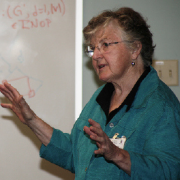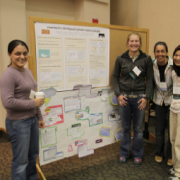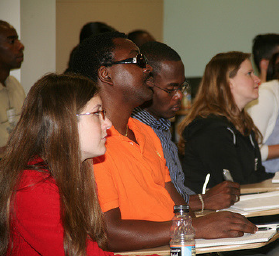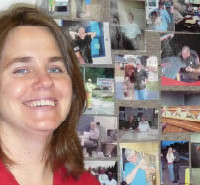Discipline-Specific Workshops
Originally Printed in the Summer/Fall 2010 Newsletter
By Margaret Martonosi, Princeton University
In 2005, CRA-W and the Coalition to Diversify Computing (CDC) began collaborating on a program encouraging discipline-specific mentoring workshops in various sub-fields of computing. The goal of these workshops is to increase the participation and success of members of underrepresented groups within a specific research area by offering discipline-specific technical information and career mentoring. Professors Juan Gilbert (Auburn University) and Margaret Martonosi (Princeton) lead this program. This program is funded by a grant from the NSF Broadening Participation in Computing (BPC) program.
Building Skills, Building Confidence, Building Community

Turing Award Winner, Fran Allen, speaking at Summer School on Parallel Programming and Architectures
The program on Discipline-Specific Workshops was formed to complement other CRA-W activities that span the entire field of computing. With DSWs, the goal is to encourage diversity events that focus on a particular sub-field. These events can offer specific technical background information, as well as sessions on topics and future trends of interest. Such specific information can bolster a student’s confidence in succeeding at the field, and can also spark excitement about the path they’ve chosen. In addition, meeting with fellow students and researchers from within a chosen sub-field can give each attendee a sense of community related to their research topic. These are the same people they will be seeing at conferences for years to come, and in some cases, people who met at DSWs have become research collaborators and co-authors.
Feedback and Stats on Past DSWs

Poster session at Operating Systems Diversity Workshop
In the last three years over 525 participants, nearly all women or underrepresented minorities, have participated in a discipline-specific workshop. From a study of participants in the 2008 Discipline Specific Workshops, we found that two thirds of them (125) indicated that because of their attendance at a DSW, their confidence that they could complete a graduate degree in computing increased either a little or a lot. Three quarters of the attendees said that, because of the workshop, their interest in having a research career in the workshop’s subject area increased by either a little or a lot.
Who should attend a DSW

Attendees at the CompArch Summer School on Parallel Programming and Architectures at Brown University in 2008.
Most of the DSWs organized thus far have focused on graduate students, while also including senior undergraduates and some young faculty. A few DSWs have instead focused on undergraduates, introducing them to a CS sub-field and its key research issues.
Who should propose and organize a DSW
If you are a PhD level researcher (or established industry engineer) in a particular computer science and engineering subtopic, we hope you’ll consider organizing a DSW. Over the past four years, several different DSW models have been used. In some cases, the workshop has been located at the site of a sub-field’s major conference, perhaps the weekend before it begins. With this approach, attendees get a good opportunity to attend the flagship conference, in addition to the workshop. Another approach is to host the workshop at a separate location and time, for example a university campus during the summer. This second approach can be less expensive in terms of room and catering fees, and can offer the workshop more of a “retreat” feel. On the other hand, it can be more difficult to recruit top-flight speakers and panelists to a standalone event.
The best DSWs include a lively mix of technical sessions with career mentoring advice. Post-workshop evaluations consistently note that it is valuable to include some “participatory” events in the program. These might include events like a poster session, a hot topics session of 2-minute talks, one-on-one curricu-lum vitae feedback, or others.





